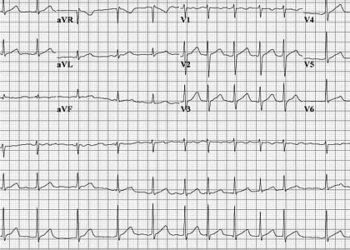Self-expanding valve has lower rates of dysfunction than balloon-expandable valve for small aortic annulus
1. In this randomized controlled trial, a self-expanding supra-annular valve was superior to a balloon-expandable valve for bioprosthetic-valve dysfunction among patients with severe aortic stenosis (AS) and a small aortic annulus.
2. The self-expanding valve was noninferior to the balloon-expandable valve for a composite of death, disabling stroke, or rehospitalization for heart failure.
Evidence Rating Level: 1 (Excellent)
Study Rundown: AS, a thickening and narrowing of the aortic valve, is associated with significant mortality and morbidity, especially when characterized by symptoms of heart failure, syncope, or angina. Transcatheter aortic-valve replacement (TAVR) has become the preferred treatment method over surgical repair for most patients with severe symptomatic AS. Self-expanding supra-annular valves have demonstrated better hemodynamic properties than balloon-expandable valves in TAVR prostheses, although trials investigating the different characteristics exhibited by the different prostheses are limited. Individuals with a small aortic-valve annulus comprise a significant proportion of patients with severe AS, and these individuals are at increased risk for impaired valve hemodynamics following TAVR. Hence, this trial investigated the clinical outcomes and valve performance of the self-expanding supra-annular and balloon-expandable valve in patients with severe symptomatic AS and a small aortic annulus. Through 12 months, the self-expanding supraannular valve was superior to the balloon-expandable valve, concerning a lower incidence of bioprosthetic-valve dysfunction. The self-expanding valve was also noninferior to the balloon-expandable valve for clinical outcomes defined as a composite of death, disabling stroke, and rehospitalization for heart failure through 12 months. The generalizability of the study findings is limited to the valves used in the trial and the measurement of valve hemodynamics was limited to echocardiography rather than more invasive methods.
Click to read the study in NEJM
In-Depth [randomized controlled trial]: SMART (Small Annuli Randomized to Evolut or SAPIEN) is a five-year, prospective, randomized-controlled trial investigating clinical outcomes and valve performance of the self-expanding supra-annular valve and balloon-expandable valve in patients undergoing TAVR with severe AS and a small aortic annulus. To be eligible, patients had to have an aortic annulus area of 430 mm2 or less and suitable anatomy for TAVR with the self-expanding Evolut (Medtronic) valve and the balloon-expandable SAPIEN 3/3 Ultra (Edwards Lifesciences) valve. Enrolled patients were randomly assigned in a 1:1 ratio to receive either Evolut or SAPIEN. The two coprimary endpoints assessed through 12 months were a clinical outcome composite of death, disabling stroke, or rehospitalization for heart failure and a composite endpoint of bioprosthetic-valve dysfunction. A total of 737 patients underwent randomization, and 716 received treatment. The mean patient age was 80 years, and the mean (±standard deviation) aortic annular area was 381.9±34.1 mm2. The Kaplan-Meier estimate of patients with a clinical outcome composite of death, disabling stroke, or rehospitalization for heart failure through 12 months was 9.4% in the self-expanding valve group and 10.6% in the balloon-expandable valve group (difference, -1.2 percentage points; 90% Confidence Interval [CI], -4.9 to 2.5; p<0.001 for noninferiority). The Kaplan-Meier estimate of patients with bioprosthetic-valve dysfunction through 12 months was 9.4% and 41.6%, respectively (difference, -32.2 percentage points; 95% CI, -38.7 to -25.6; p<0.001 for superiority). Death from any cause or disabling stroke occurred in 6.8% of patients in the self-expanding valve group and 7.5% of patients in the balloon-expandable valve group through 12 months (hazard ratio, 0.92; 95% CI, 0.53 to 1.59). Overall, the self-expanding supra-annular valve was noninferior to the balloon-expanding valve with respect to clinical outcomes.
Image: PD
©2024 2 Minute Medicine, Inc. All rights reserved. No works may be reproduced without expressed written consent from 2 Minute Medicine, Inc. Inquire about licensing here. No article should be construed as medical advice and is not intended as such by the authors or by 2 Minute Medicine, Inc.









